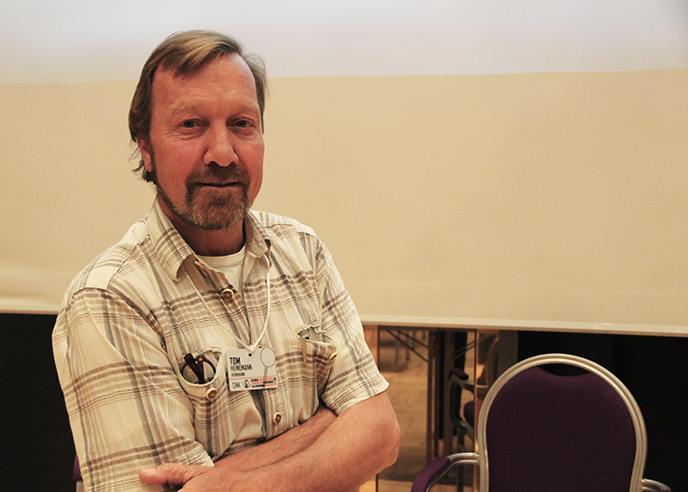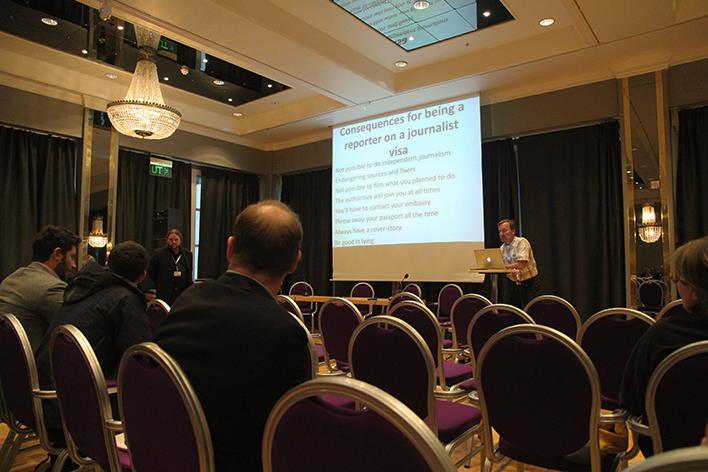
Tom Heinemann has made several documentaries, including “A Tower of Primises” and “The Bitter Taste of Tea”. Photo: Nina Tuv
Tom Heinemann is a Danish independent investigative journalist and filmmaker who focuses on global issues. He has 19 years of experience as a journalist. In his session at the Global Investigative Journalism Conference, Investigating on Foreign Ground, he offered tips on how to do in-depth reporting on foreign soil:
Find a Fixer
As an investigative journalist you sometimes know of a story you would want to make, or an issue that you want to report on. It might not always be possible to get access to the first-hand information that you need.
“Find a fixer from that specific country. He will be your eyes and ears, providing you with facts and information that you can revise before talking to your editor.”
Prepare Yourself
 Heinemann has done several films about global issues. One is “A Tower of Promises” that exposes how some Scandinavian companies have neglected their own Code of Conduct in their factories in Bangladesh.
Heinemann has done several films about global issues. One is “A Tower of Promises” that exposes how some Scandinavian companies have neglected their own Code of Conduct in their factories in Bangladesh.
“I had to learn the process of galvanizing steel and the technical language tied to the production in order to undertake an investigation. I also visited a factory in Sweden where we filmed how the process should be done.”
Make a Reasonable Cover Story
In the making of “A Tower of Promises,” Heinemann also needed to gain access to the site of production in Bangladesh. He decided that the best way to gain the material he needed was to go undercover.
Get a Business Card
Belonging to creating a credible cover story for yourself, a tip is to make a business card with a fake name and profession. Heinemann named himself a research scientist, making that the objective of his visits to the factories.
Learn How to Use Both Hidden and Open Camera.
“I had my camerawoman with me while visiting the factory in Bangladesh, and while I appeared very curious and interested in what the production manager was showing me, she was able to film the areas we actually were there to cover, such as child labor and chemical waste dumps.”
Bring the Right Device
When reporting in developing countries, a big camera device will attract too much attention. Heinemann suggests only bringing a small camera to such investigations.
Secure Your Material
Do not confront anyone until you have secured your tapes and hard-drives at a safe place.

Photo: Nina Tuv
Get Written Consent From People Involved in Your Documentary
If you want to sell your finished product to other countries, you in many cases need a written consent from your sources — that they gave their interviews freely and voluntarily.
Quantitative Journalism Can Be Quality Journalism
“When making the film “The Bitter Taste of Tea,” we decided to visit four tea-producing countries instead of one, just to be sure. This gives you a certainty that what you are doing is right.”
Tourist Visa Versus Journalist Visa
Heinemann also speaks about how there are pros and cons to being a reporter on a tourist visa and on a journalist visa.
“When I travel as a tourist I have a cover story, and I need to be good at lying. When traveling with a journalist visa you cannot do independent investigations. I have been surveilled and banned from entering certain countries.”
Here Are Some Other of Heinemann’s Tips:
Make three copies of your work — and leave one behind.
Build and maintain your networks
Help them help yourself
Trust is a matter of good intuition
Insecure? Get a second opinion
The bigger they come, the harder they hit back
Do security assessments on all crew members
The authors are journalism students at the University College of Volda who are on special assignment covering #gijc15.
